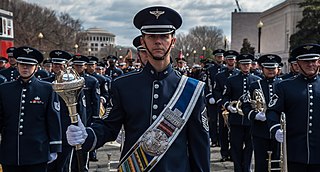Related Research Articles

Frederick Joseph Ricketts was an English composer of marches for band. Under the pen name Kenneth J. Alford, he composed marches which are considered to be great examples of the art. He was a Bandmaster in the British Army, and Royal Marines Director of Music. Conductor Sir Vivian Dunn called Ricketts "The British March King". Ricketts' frequent use of the saxophone contributed to its permanent inclusion in military bands. His best known work is the "Colonel Bogey March".
Sir Dean Goffin was one of New Zealand's first prolific Salvation Army composers who composed not only music for the Army but for non-Army bands as well.

Lieutenant Colonel (Dr) Ray Steadman-Allen was a British composer of choral and brass band music for the Salvation Army and for band competition.
Maidenhead Citadel Band (MCB) is a Salvation Army Band and part of the Maidenhead Corps of The Salvation Army. For over 120 years the band has consistently contributed to the worship and evangelical outreach promoted by the Maidenhead Corps in the Royal Borough of Windsor and Maidenhead.

A brass band is a musical ensemble generally consisting primarily of brass instruments, most often with a percussion section. Ensembles that include brass and woodwind instruments can in certain traditions also be termed brass bands, but may be more correctly termed military bands, concert bands, or "brass and reed" bands.
The Chalk Farm Band is brass band of the Salvation Army located at the Salvation Army Centre in Haverstock Hill, Chalk Farm, London, England. It is one of the best known brass bands of the Salvation Army in the UK.

A bandmaster is the leader and conductor of a band, usually a concert band, military band, brass band or a marching band.

The International Staff Band is the premier brass band of The Salvation Army.

The Salvation Army, Parramatta is a Salvation Army Corps located in the suburb of Parramatta, New South Wales, Australia. It is the 75th oldest active Salvation Army Corps in Australia. Situated in the western suburbs of Sydney, it has survived two arson attacks, been led by some of the most prominent Australian Salvation Army officers of the modern era, and has actively ministered to the people of Parramatta and the surrounding regions since 1884.

A Salvation Army brass band is a brass band affiliated with a Corps, Division or Territory of the Salvation Army. In society, a Salvation Army band playing in public places during Christian events in the calendar such as Christmas has become a part of seasonal customs, particularly in the UK.
The Melbourne Staff Band (MSB) is the premier brass band of the Salvation Army in Australia.
The Household Troops Band (HTB) Is a brass band associated with the Salvation Army. It consists of musicians who are Salvation Army members from various regions across the United Kingdom. The band regularly performs at Salvation Army corps and venues throughout the UK and engages in annual recording projects. Throughout its history, the band has embarked on international tours to numerous countries.

Sydney Congress Hall is a Salvation Army Corps situated in the Sydney's central business district. It is a local expression of The Salvation Army, an international movement which is an evangelical part of the universal Christian Church.
Symphony in B-flat for Band was written by the German composer Paul Hindemith in 1951. It was premiered on April 5 of that year by the U.S. Army Band "Pershing's Own" with the composer conducting.
The Sydney Youth Band of the Salvation Army is a brass band based in Sydney New South Wales, whose membership is that of people aged 13–30. It is primarily made up of Salvation Army members, including soldiers and others that attend The Salvation Army. It is a part of the Salvation Army's NSW/ACT Division but functions more as a regional youth band for the Sydney, Newcastle and Wollongong area.

Since its establishment in 1885, The Salvation Army's Brisbane City Temple Corps has used music to convey its gospel message and attract new people to its meetings. At the forefront of this ministry for 130 years has been the Brisbane City Temple Band. Having toured nationally and internationally as well as performing on ABC Radio, the Temple Band has served its corps, community and city well.

The United States Air Force Band is a U.S. military band consisting of 184 active-duty members of the United States Air Force.

Callender's Cableworks Band was an amateur brass band made up of members employed by and under the patronage of Erith Works at the Callender Cable & Construction Co. Ltd, later British Insulated Callender's Cables, in Belvedere, Kent, and performing in London and south-east England. They were prolific broadcasters in the early years of BBC Radio, and won 25 brass band competitions.

The International Staff Songsters (ISS) is the principal choir of the Salvation Army. Based in London, UK, the group performs Christian choral music in concerts, worship services and television and radio broadcasts, and has recorded more than 50 albums since its inauguration.
References
- 1 2 Caring Magazine website, Hendon Band Background
- 1 2 3 4 5 Regal Zonophone website, Albums section, The Big Sound
- ↑ Brass Band World website, Exclusive Interview with Philip Cobb
- ↑ San Diego Office of the City Clerk website, Mayoral Artifacts section, Introduction of Hendon Band
- ↑ Caring Magazine website, Hendon Band captivates crowds throughout the West, article dated April 18, 2005
- ↑ London Central Fellowship Band, Musical Director, David Rudd (M.A., L.R.A.M.)
- ↑ Barbican website, What's On section, A musical spectacular from one of the Salvation Army’s finest brass bands under the leadership of Dr Stephen Cobb.
- ↑ Discogs website, The Hendon Band